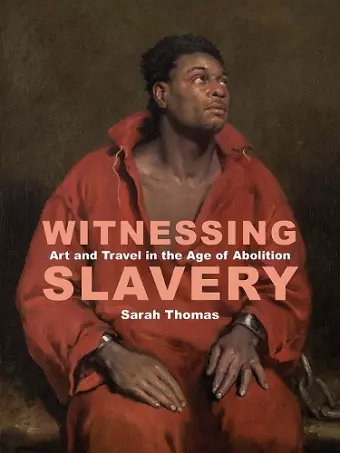Witnessing Slavery
Art and Travel in the Age of Abolition
Format:Hardback
Publisher:Paul Mellon Centre for Studies in British Art
Published:10th Sep '19
Should be back in stock very soon

A timely and original look at the role of the eyewitness account in the representation of slavery in British and European art
Gathering together over 160 paintings, watercolors, drawings, and prints, this book offers an unprecedented examination of the shifting iconography of slavery in British and European art between 1760 and 1840. In addition to considering how the work of artists such as Agostino Brunias, James Hakewill, and Augustus Earle responded to abolitionist politics, Sarah Thomas examines the importance of the eyewitness account in endowing visual representations of transatlantic slavery with veracity. “Being there,” indeed, became significant not only because of the empirical opportunities to document slave life it afforded but also because the imagery of the eyewitness was more credible than sketches and paintings created by the “armchair traveler” at home. Full of original insights that cast a new light on these highly charged images, this volume reconsiders how slavery was depicted within a historical context in which truth was a deeply contested subject.
Distributed for the Paul Mellon Centre for Studies in British Art
“Thomas delivered an excellent volume in which she comprehensibly shows the great impact that visual culture had on the era of abolition and how contested images of eyewitness artists were used for the propaganda purposes of the pro- and anti-slavery movements.”—Annika Vosseler, Connections
“Engaging and provocative . . . Deals mainly with British publications during the heyday of illustrated book publishing, persuasively arguing that these artworks were deeply influenced by the politics surrounding their production.”—Richard Price, New West Indian Guide
“[A] lavishly illustrated and finely produced book . . . Thomas brings together several bodies of scholarship on the visual culture of slavery, travel, and imperial landscape.”—Esther Chadwick, Art History
“A powerful look at the varied contexts in which artists found themselves in the Americas as witnesses to societies that depended on enslaved labour . . . The book’s resonance with our contemporary reality is impossible to miss.”—Allison Young, Slavery & Abolition
“[A] beautifully effective book. Large-size, perfect color reproductions of paintings and prints on a remarkably readable and viewable heavy-stock paper make it possible to survey the art of slavery for our own determinations.”—John E. Crowley, Journal of British Studies
ISBN: 9781913107055
Dimensions: unknown
Weight: unknown
304 pages